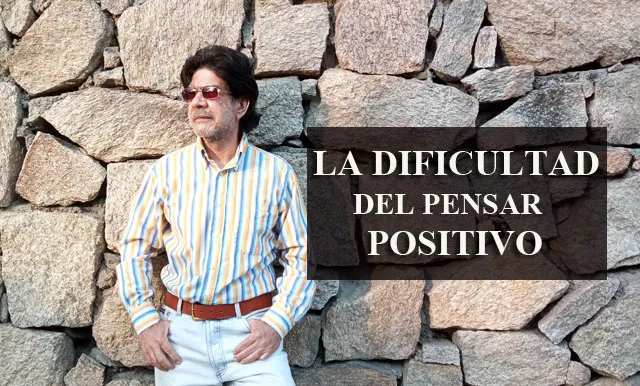
Lo natural para nuestro cerebro es pensar negativamente. Sí aunque esa sentencia pueda parecer extraña, sobre todo en este tiempo donde se reivindica el pensamiento positivo. Para entender por qué es de ese modo tenemos que remontarnos a los primeros momentos de la historia humana.
Nuestros más lejanos ancestros vivían en un mundo muy hostil, todo a su alrededor era fuente de peligros. Las amenazas a la vida provenían de diferentes fuentes: de las fuerzas de la naturaleza, los animales salvajes y hasta de nuestros propios semejantes que buscaban cualquier oportunidad de aprovecharse de la debilidad del otro.
En tales condiciones la primera ley de la naturaleza es la sobrevivencia y nuestro cerebro es el mejor aliado para cumplirla. Así que nuestros primeros pensamientos estuvieron en sintonía con ese mundo plagado de peligros, se pensaba en el miedo, en estar alerta, en desconfiar de todo y de todos. ¿Podía ser de otro modo…?
Es temerario pensar que en un mundo de condiciones extremas y de peligro permanente el ser humano pudiera entregarse a la contemplación relajada. Ya llegaría el tiempo para eso pero tendrían que pasar miles de años.
Esos pensamientos negativos se convirtieron en hábitos, esto es, en respuestas casi automáticas ante situaciones parecidas. Un hábito puede ser, por ejemplo, el cerrar la puerta con llave cada vez que llegamos de la calle, lo hacemos sin pensarlo. Al cerebro humano le encanta la economía y por eso vamos formando tantas respuestas repetitivas, es un mecanismo fisiológico que busca la eficiencia.
El problema con los hábitos es que van formando rutas neuronales, cada hábito crea una especie de camino en el cerebro y por eso es tan difícil deshacerse de ellos. Esto lo saben todas las personas que, por ejemplo, les cuesta mantener una rutina de ejercicios, se han acostumbrado a estar sedentarios.

Mientras más tiempo se mantenga el cerebro repitiendo el mismo hábito más sólida será la calidad de sus rutas neuronales, por lo que habrá más dificultad para poder salir de ese hábito e instalar uno nuevo.
Entonces, si nuestros ancestros estuvieron miles de años en estado de alerta, viviendo la vida en la agonía del peligro perpetuo. Es comprensible que se hayan formado en ellos unos hábitos de pensamiento basados en lo negativo.
No fueron uno o dos días en los que se repitieron estos hábitos para mantenerlos vivos, fueron miles de años. Durante todo ese tiempo se consolidaron rutas neuronales muy profundas, casi como si fueran huellas genéticas.
El pensamiento negativo se ha transmitido de generación en generación a lo largo de la historia, es lo que más ha practicado la humanidad. Por eso es tan fácil pensar negativamente. Como vemos no es solamente un asunto de educación, hay algo mucho más profundo allí.
Es muy poco el tiempo que ha transcurrido desde que nuestra especie logró superar las condiciones de vida peligrosas. Y nosotros tenemos el privilegio de conocer un mundo mucho más amable, seguro y civilizado. Por eso en estos días nos empeñamos en reivindicar el pensar positivo como una forma de relacionarnos mejor y poder llevar una vida más placentera.
Sin embargo, debemos tener presente que cuando decidimos cambiar un patrón de pensamiento por otro estamos luchando contra una herencia milenaria. No obstante, eso no debe desanimarnos. Solo nos indica que la tarea no es fácil.
Si comenzamos a practicar el pensamiento positivo y lo hacemos parte de nuestros hábitos de pensar, de igual modo que como sucedió con el pensar negativo se irán formando las rutas neuronales para acceder a esos nuevos hábitos de forma instantánea.
Así por ejemplo, si comenzamos desde hoy a alimentar nuestra mente con ideas positivas, es bastante probable que a la vuelta de pocos años ya nuestra respuesta primera no sea la fatalidad sino el optimismo.
A medida que más personas asuman el pensamiento positivo como parte fundamental de su manera de entender la realidad, estaremos dando los pasos para que en el futuro podamos relacionarnos mejor.
Gracias por tu tiempo.
Fuente de imágenes. I


It is natural for our brain to think negatively. Yes, although this sentence may seem strange, especially in these times when positive thinking is claimed. To understand why it is that way we have to go back to the first moments of human history.
Our most distant ancestors lived in a very hostile world, everything around them was a source of danger. Threats to life came from different sources: from the forces of nature, from wild animals and even from our own kind who sought any opportunity to take advantage of the weakness of others.
In such conditions the first law of nature is survival and our brain is the best ally to fulfill it. So our first thoughts were in tune with that world plagued with dangers, we thought of fear, of being alert, of being suspicious of everything and everyone. Could it be otherwise...?
It is foolhardy to think that in a world of extreme conditions and permanent danger, the human being could surrender to relaxed contemplation. The time would come for that, but thousands of years would have to pass.
These negative thoughts became habits, that is, almost automatic responses to similar situations. A habit can be, for example, locking the door every time we come in from the street, we do it without thinking about it. The human brain loves economy and that is why we form so many repetitive responses, it is a physiological mechanism that seeks efficiency.
The problem with habits is that they form neural pathways, each habit creates a kind of pathway in the brain and that is why it is so difficult to get rid of them. This is known by all people who, for example, find it difficult to maintain an exercise routine, they have become accustomed to being sedentary.
The longer the brain keeps repeating the same habit, the more solid will be the quality of its neuronal pathways, so it will be more difficult to get out of that habit and install a new one.
So, if our ancestors were thousands of years in a state of alertness, living life in the agony of perpetual danger. It is understandable that they formed habits of thought based on the negative.

It was not one or two days in which these habits were repeated to keep them alive, it was thousands of years. During all that time very deep neural pathways were consolidated, almost as if they were genetic imprints.
Negative thinking has been transmitted from generation to generation throughout history, it is what humanity has practiced the most. That is why it is so easy to think negatively. As we see it is not only a matter of education, there is something much deeper there.
Very little time has passed since our species managed to overcome dangerous living conditions. And we have the privilege of knowing a much kinder, safer and more civilized world. That is why these days we insist on positive thinking as a way to relate better and lead a more pleasant life.
However, we must keep in mind that when we decide to change one thought pattern for another, we are fighting against a millenary heritage. However, this should not discourage us. It only indicates that the task is not easy.
If we begin to practice positive thinking and make it part of our thinking habits, in the same way that happened with negative thinking, the neuronal pathways will be formed to access these new habits instantly.
Thus, for example, if we start today to feed our mind with positive ideas, it is quite likely that in a few years our first response will no longer be doom but optimism.
As more people assume positive thinking as a fundamental part of their way of understanding reality, we will be taking steps so that in the future we will be able to relate to each other better.
Thank you for your time.







Te invito a apoyar este proyecto como witness y a formar parte de esta gran comunidad uniéndote a su Discord en el siguiente enlace:
Discord de la comunidad Cervantes
